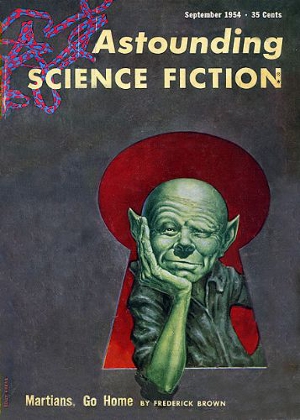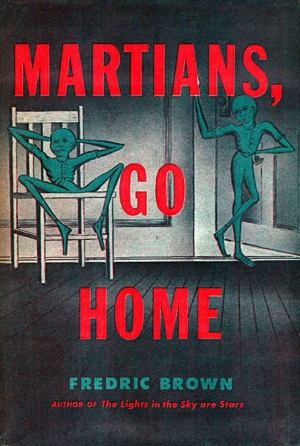 I experienced a bittersweet sensation a few years ago when I read that Fredric Brown won the 2012 Cordwainer Smith Rediscovery Award. As a fan of his work, I certainly felt that he was deserving, but therein lies the problem. To win the award, he first had to be largely forgotten. Two years ago, I reviewed what I consider his finest work of science fiction, What Mad Universe. Another of his novels that SF humor fans should seek out is Martians, Go Home. The story first appeared as a novella in the September, 1954 issue of Astounding (cover art by Frank Kelly Freas), and was later expanded and published as a novel by Dutton in 1955.
I experienced a bittersweet sensation a few years ago when I read that Fredric Brown won the 2012 Cordwainer Smith Rediscovery Award. As a fan of his work, I certainly felt that he was deserving, but therein lies the problem. To win the award, he first had to be largely forgotten. Two years ago, I reviewed what I consider his finest work of science fiction, What Mad Universe. Another of his novels that SF humor fans should seek out is Martians, Go Home. The story first appeared as a novella in the September, 1954 issue of Astounding (cover art by Frank Kelly Freas), and was later expanded and published as a novel by Dutton in 1955.
The story is told through the voice of an omniscient narrator who begins by telling us in the prologue that the people of earth should have been better prepared for the coming of the Martians. In particular, he notes that science fiction had been warning them for years of just such an eventuality. But science fiction writers had failed to anticipate two characteristics of the extraterrestrials. First, they steadfastly refused to depict their Martians as clichéd Little Green Men, which as it turns out, they were. Second, none of them had foreseen how the aliens would behave.
 The narrator then directs us to a remote shack in California where a writer by the name of Luke Devereaux is trying to break out of a bad case of writer’s block. When at last it seems he is getting an inkling of an idea involving Martians, a knock at the door interrupts him. He answers the door to find a two and half foot tall green humanoid.
The narrator then directs us to a remote shack in California where a writer by the name of Luke Devereaux is trying to break out of a bad case of writer’s block. When at last it seems he is getting an inkling of an idea involving Martians, a knock at the door interrupts him. He answers the door to find a two and half foot tall green humanoid.
The LGM proves to be obnoxious and condescending with an idiomatic command of English learned by monitoring earth’s radio programs. The Martian has come to earth by “kwimming,” a mental sort of teleportation that it claims humans are too stupid to grasp. This being a difficult situation to accept, Luke proceeds to get drunk and wonders if he is either hallucinating or crazy. The alien’s continuous taunting eventually results in Luke trying to attack it, only to find that his hands pass right through the Martian as if it was not there. He takes a photograph of the alien, intent on having it developed in the morning to disprove the Martian’s existence.
But when Luke goes into town the next day, he learns that Martians have popped up all over the world causing widespread panic and mayhem. The narrator then relates a series of examples of this chaos that resembles a more extreme and comical version of the panic caused by Orson Welles’ radio broadcast of The War of the Worlds. Soon, people start to go crazy under a barrage of jeering from a billion Martian invaders.
 I won’t spoil the rest of the story for you, but I will point out two facets of the novel that may be of interest. First, the story is (like What Mad Universe) recursive in a way that should be appealing to SF fans. And second, Brown engages in the kind of reality questioning associated with Philip Dick, and indeed, Brown did influence Dick’s writing.
I won’t spoil the rest of the story for you, but I will point out two facets of the novel that may be of interest. First, the story is (like What Mad Universe) recursive in a way that should be appealing to SF fans. And second, Brown engages in the kind of reality questioning associated with Philip Dick, and indeed, Brown did influence Dick’s writing.
Although Martians, Go Home is not quite up to the exceptional quality of What Mad Universe, it is more manifestly comedic and should have broad appeal with SF fans, writers, and anyone who enjoys a good laugh. Used copies are readily available, but if you are looking for a new copy, your only option is Martians and Madness published by NESFA Press. I highly recommend this omnibus of Fredric Brown novels that not only contains Martians, Go Home, but also the aforementioned What Mad Universe. And if you get a chance to watch the 1989 movie adaptation of Martians, Go Home, don’t.











Chat Conversation Start
8:47AM
Sequential Pulp Comics’ Kickstarter for the completed and June solicited Fredric Brown’s Martians, Go Home graphic novel with an Introduction by Vincent Di Fate and Afterword by Barry N. Malzberg. I hope you will consider joining us.
https://www.kickstarter.com/projects/673090647/fredric-browns-martians-go-home-graphic-novel?ref=email